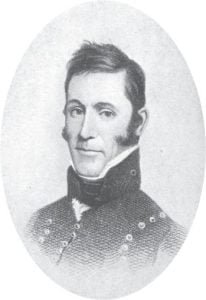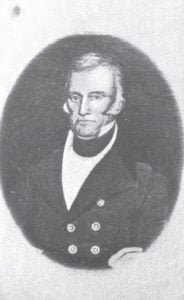The subject of this sketch was the second son of Samuel, Jr. and Elizabeth (Wright) Partridge, and was born at Norwich, Feb. 12, 1785, on the farm where his father and grandfather located when they came to this town.
He remained at home, doing the work that fell to the lot of the sons of New England farmers in those days, until he entered Dartmouth College in 1802. He continued his course in college until 1805, when he entered the U. S. Military Academy at West Point, being the first person from his native town to enter that institution. After his graduation at the academy he filled many positions on the academic staff there, besides being superintendent of the academy at different times. In 1817 he resigned his commission of captain in the corps of engineers.
Captain Partridge was chief of the American party in running a northeastern boundary, in 1819, between this country and Canada, under the Fifth Article of the Treaty of Ghent; Surveyor General of Vermont, 1823: represented his native town in the legislature in 1833, 1834, 1837, and 1839; three times his party’s candidate for Congress, but unsuccessful, as the district was largely of a different political coloring. In 1812, Dartmouth College conferred upon him the honorary degree of A. M., and the University of Vermont did likewise in 1821, it being the only honorary degree conferred by that corporation that year. In the same year the Presidency of that institution was offered him, only to be declined by him.

When at US Mil. Acad., West Point
Captain Partridge was a noted pedestrian, on several occasions walking sixty miles a day, and once pacing off seventy miles within that limit. Once when returning to his home from an excursion to Fort Ticonderoga, and other points of historic interest in that vicinity, he averaged fifty-four miles daily for three consecutive days, crossing the Green Mountains and carrying his knapsack and barometer (his inseparable companions on all his pedestrian excursions).
It has been said of him by one who knew him well in his youth that he was never known to utter a vulgar or profane word, or a by-word, or to use tobacco in any form. Such he was through life, and a most constant attendant upon Sabbath services.
In 1837, Capt. Partridge married Ann Elizabeth Swasey, daughter of John Swasey, a merchant of Claremont, New Hampshire, and to them were born two sons, George M. C. and Henry V., the former passing away May 12, 1855.
After a short illness, Captain Partridge died, January 16, 1854, in the sixty-ninth year of his age, followed by his widow. Oct. 11, 1877 in her ninety-second year.
Captain Partridge as an Educator

About 54 years of age
The influence of Captain Partridge in this direction was important and far reaching. He was one of the first to point out the vices and defects of the higher education of his time. It is a well-known fact that the physical development of the literary and student class has been improved within the last half century. Captain Partridge wrought out in his own mind a scheme of education, mental, moral, and physical, that was thoroughly practical and American. He then set himself to establish schools wherein his ideas could be carried into operation. These schools proved a great success, and in them were trained many young men whose services to the country have proved to be of the highest value. His capital maxim in education was, mens sana in corpore sano, a sound mind in a sound body. In his system of education he combined the physical training of the Old Greeks with the ardent patriotism of the Old Romans, and added thereto other elements original with himself, and then Americanized and modernized the whole. His contribution to modern education was important, and for his labors in this direction, Captain Partridge well deserves the gratitude of his countrymen and of posterity. We have lived to see the defects of a college education as pointed out by Captain Partridge two generations ago in a large measure corrected. The gymnasium is now an essential part of every well-appointed institution of learning. Manly sports and games everywhere receive large and constant attention.
A wide option of elective studies is now offered to every college student in place of the old inflexible curriculum of strictly scholastic training. Industrial education is everywhere coming into use. The natural and political sciences are assiduously cultivated with largely endowed professional chairs in all the universities, and every facility given for acquiring a practical education.
Indeed it is doubtful if the idea of the Agricultural College was not original with Captain Partridge rather than with our Vermont Senator. From a lecture given by Captain Partridge before the establishment of his Military Academy at Norwich, in 1820, I quote the following:
In a country like ours, which is emphatically agricultural, I presume it will not be doubted that a practical, scientific knowledge of agriculture would constitute an important appendage to the education of every American citizen. Indeed the most certain mode of improving the agriculture of the country will be to make it a branch of elementary education. By these means it will not only be improved, but a knowledge of improvements generally disseminated among the great mass of the people … ” After outlining a suitable course of advanced studies, he adds: ”To the institution should be attached a range of mechanic shops, where those who possess an aptitude and inclination might occasionally employ a leisure hour in learning the use of tools and the knowledge of some useful mechanic art.”
What is this but Mr. Morrill’s College of Agriculture and Mechanic Arts antedated by forty years?
